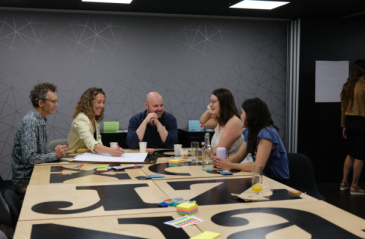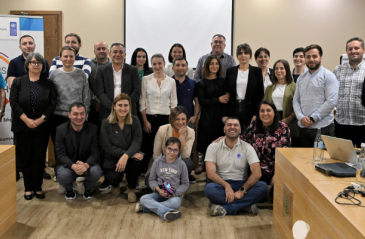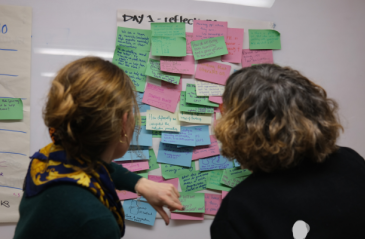
The power of storytelling in climate leadership

Japan has long sought to deploy funds and other resources to speed Africa's development
Share articleAchieving regional integration is a top priority for @jica_direct_en
Share articleInfrastructure development and One Stop Border Posts are key to Africa's growth
Share articleWe put our vision for government into practice through learning partner projects that align with our values and help reimagine government so that it works for everyone.
The shores of the African continent have long attracted attention from near and far. The rich natural resources, the fast-rising population - not to mention a rapidly growing middle class - and its sheer potential represent a potent elixir, one that offers much allure to the international community.
For Japanese policymakers, though, the continent represents an opportunity to lift people up and bring countries together through closer economic and social integration. Just last year, for example, the sixth Tokyo International Conference on African Development (TICAD) saw the unveiling of a US$30 billion, three-year aid package, aimed at improving African infrastructure, healthcare, education, and overall human security.
Of course, money talks to a certain extent, but Hiroshi Kato, senior vice president of the Japan International Cooperation Agency (JICA), points out that the funding represents only one element of his country's approach to the continent. Of greater significance, he believes, is the long-term commitment to regional integration - both within countries and across national borders - as a well- established means of lifting countries up.
"Regional integration is one of the principles that have guided Japan's international cooperation," he explains. "This is how we have sought to help countries in Southeast Asia and, thanks partly to this approach, the region has grown into an engine of genuine world growth. JICA has been applying similar approaches to Africa, because we believe that regional integration is a great help in developing individual countries in such a way that none will be left behind."
Since its creation in 1974, JICA - which is one of the world's largest bilateral aid organisations - has provided development assistance to 150 countries around the world via close on 100 overseas offices. In 2008, it renewed its vision - "inclusive and dynamic development" - and this approach has since underpinned its operations across the African continent.
Kato says that JICA's recent and ongoing projects across Africa can be traced to the belief that connecting different countries and people can have a positive impact not only on private sector growth but also on society as a whole. "We have been doing a number of different things, such as contributing towards the Northern Corridor connecting Mombasa up to Kigali," he points out. "And we have also been financing specific infrastructure projects like roads, bridges and ports because infrastructure is one of the fundamentally important conditions for a thriving private sector in any country."
These projects range from comprehensive corridor development in Mozambique to improving the urban transport network in Nairobi. They are being planned and implemented with the aim of ensuring that the benefits of economic growth are felt by all people, not just a chosen few. To this end, infrastructure is crucial because it links markets, and this helps catalyse trade and provide a foundation for greater private sector investment. In turn, this will lead to improved living standards, a reduction in poverty, and more jobs.
One Stop Border Posts are of particular significance. "Making border crossings easier to navigate - for both goods and people - promotes mobility and greater regional development and integration," Kato points out. "We experienced success on the Zambia-Zimbabwe border, and have since progressed to support the introduction of many other schemes at different borders across the continent. For example, we are now very interested in helping improve the Beit Bridge border post between South Africa and Zimbabwe, together with other international and domestic partners."
These successes underline the importance of making a long-term commitment to the continent. Kato, though, is keen to stress that making a positive developmental impact is far from straightforward - particularly in a continent as diverse as Africa. He believes that there are several lessons to be drawn from JICA's experiences - starting with the importance of consistency.
"Regional development and regional infrastructure development is a challenging task, and very complicated," he points out. "This means that you have to be consistent in supporting African countries and their governments in their effort to realise their aspirations. Japan has been very proud to be consistently part of this exercise, especially since the early 2000s."
Kato also cites the importance of leaving no stone unturned. Details matter - especially when it comes to the complex tapestry that is regional infrastructure development. "Infrastructure and regional development is a very complex and multifaceted issue," he says. "You can't just focus on a single sector and hope to have the desired impact. It is very important to be comprehensive in order to be effective. For this you have to have commitment - of course - and also the necessary capacity. Because this is such a challenging task, you need sufficient capacity in both governments and the private sector in order to move forward."
He goes on to say that it is also important, as in any transformation project, to keep up the momentum. This means that when good results are achieved, they should be applauded and recognised in order to encourage further progress. "Since regional development is such a complex undertaking we need to have convincing results," he says. "This is something which encourages us to keep moving forward and do more. We have been observing some very convincing and encouraging results, and I think some remarkable achievements have been made so far - particularly given the challenges and the complexity of the issue."
Kato, though, is keen not to rest on any laurels. As in any development context, there is always scope to do more and to move faster. But there will clearly be no letting up on the intensity and pace of development on his watch. "We all want to keep moving from talk to action - and we will," he concludes. "This is itself a reflection of a serious and rigorous self-evaluation. But the picture is far from bleak. Those of us in this community - the governments, the private sector and internal and external contributors - should also find time to congratulate ourselves. This will encourage us to do more and achieve the positive impact we are all working for."












